Oberlin Alumni Magazine
Fall 2006 Vol. 102 No. 2
The Graduate
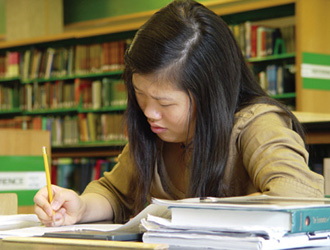 Mudd library becomes Hang Do’s second home during the days leading up to final exams.
Mudd library becomes Hang Do’s second home during the days leading up to final exams.
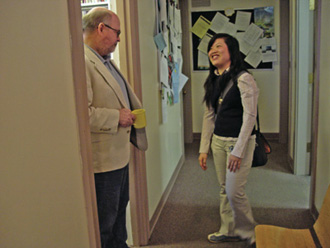 Hang will receive acknowledgement in a book co-written by Professor of Economics David Cleeton; she worked for him as a research assistant.
Hang will receive acknowledgement in a book co-written by Professor of Economics David Cleeton; she worked for him as a research assistant.
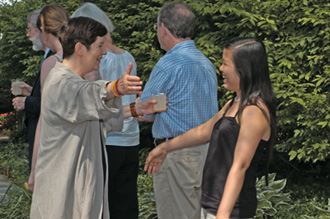 Hang is greeted by PResident Nancy Dye at a picnic honoring the winners of academic awards.
Hang is greeted by PResident Nancy Dye at a picnic honoring the winners of academic awards.
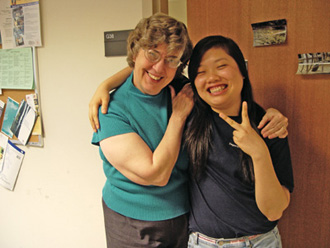 Joking with Carol Sedgwick, a student academic advisor.
Joking with Carol Sedgwick, a student academic advisor.
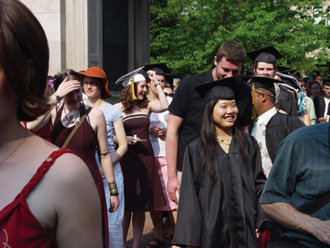 Graduation.
Graduation.
It’s two weeks before graduation day and all that is standing in the way of Hang Do’s future are two papers, a final exam, and countless good-byes from professors and friends. What follows is a journey through Hang’s last days at Oberlin and her first two months as a business-focused graduate.
Tuesday, May 16, 2006
It’s a brisk, rainy day in Oberlin. Hang slides into a comfortable couch
in an upstairs lounge in King Building and removes a slightly worn history
book from her sack. “My invention,” she smiles, waving her hand
across the bright tabs that spill over the tops of the pages. A few seconds
later, with the exception of the muffled voice of a student taking an oral
exam in a nearby classroom, the space is still. Hang, as if curled up next
to an imaginary fire, begins to read. If not for the take-home exam in her
lap, some might think she was on a study break instead of cramming for finals.
“I love history,” she says, as if talking about a boyfriend or a close family member. “Anything I love, I put time into. I want to do it. It’s not work; it’s fun, and my friends feel the same way. I’m like a lot of students here.”
Although students’ study habits during finals week don’t necessarily support Hang’s sentiment, she is like many of her classmates in other aspects. Oberlin’s career services office says that of the 212 graduating seniors who completed the “senior survey” (out of 562 surveyed), 23 percent planned to go on to graduate school. Twenty-one percent had accepted jobs prior to graduation. Hang, who double majored in economics and mathematics with a GPA of 4.02, received job offers from two investment banking firms. A former Oberlin Business Scholar, she turned down a position at UBS Investment Bank to work as an analyst at Lehman Brothers on Times Square.
“Their corporate environment is very down-to-earth,” she says. “They flew me in and kept telling me, ‘Oh, you have to talk to this person and to that person.’ I was just being myself, and they accepted me. I also met an alumnus there. He told me I belonged there, and I thought, ‘Yeah, I do.’”
Now all she has to do is graduate.
Wednesday, May 17
“I’ve only been here for a little over three hours,” says Hang in a hushed voice, glancing around Mudd library. “You see those people back there?” she points. “Many of them have been here for three days.”
It’s 4 p.m. on the third day of reading period. Hang will need to work in the computer lab a little later, but for now it’s a detour back to her room for a break. “When you get stuck and try to work, it’s more frustrating,” she says. “I like taking small breaks.”
Later, after a stop in Wilder Hall to pick through items at Oberlin’s Bi-Annual Swap (where students put clothing, shoes, and other amenities they no longer use up for dibs), Hang heads across campus. “If I’d had enough time, I would have majored in American history, too, but I’m a big math department fan,” she says offhandedly. “I’ve had teachers who have taught for 8, 10, 15 years, but they teach like it’s the first time, especially Bob Bosch, my advisor. He knows my weaknesses. I adore him. … I love this place.”
Inside Hang’s single room in Barnard House, clothes still line the closet, books rest on shelves, and posters adorn the walls. Packing won’t begin until the end of the month, when Hang begins her new, one-month lease at a place in town. She won’t leave for New York until July.
“I wanted to do some traveling this summer, but with the new governmental restrictions, I couldn’t get a travel visa,” she says, slightly bothered. “But then I got excited again, because I realized I could stay here and study for the GMAT in June.”
Postcards that hang in rows above her bed—of Vietnam, Europe, and Brussels—are all places Hang has visited during her time at Oberlin. A bigger map of Russia hangs over her pillow; she dreams of going there one day. “I don’t get scared going places by myself.”
Her parents, however, back in North Vietnam, tell a different story. They didn’t want Hang living in a foreign country, and the attacks on September 11 made matters worse. Wretched with worry during her first months on campus, they would call or e-mail Hang after reading about violence in any part of the States. “I couldn’t talk to my mother because she would cry, and soon we’d both be crying,” says Hang. “They’re OK now, but they would rather I return home and use my degree. But they’ll get over it.”
Hang is used to keeping in touch with friends all over the world. “I tell people there are two me’s—the one they see, and the virtual me,” she laughs, flipping on her computer to reveal a slew of pictures from friends on campus and around the world. “I have friends from Oberlin who will be working in D.C. All I’ll have to do is hop on a train or something; we’ll see each other often.”
Thursday, May 18
“Hang is the kind of student who doesn’t come along very often,” reflects Professor of Mathematics Bob Bosch, as Hang takes her final mathematics exam down the hall. “Her work ethic is amazing. When she told me she was going to stay in Oberlin for a month and study for the GMAT … I’d never seen anyone more excited about preparing for a test.”
His impression is affirmed by Hang’s broad smile when she emerges two hours later. Most of her classmates had trickled out earlier, but Hang likes to check and re-check her work.
“It was good,” she nearly beams. “I like that stuff.”
Before heading back to her room, or grabbing a bite to eat, or even taking a break to stretch, Hang heads to the computer lab downstairs to begin her history and math papers—10 pages each—due Saturday. “I’m going to study like crazy,” she says.
Seven hours later, aside from moving up one row in the nearly empty lab, Hang remains still and focused. “I’m going to get this done tonight; I can do it,” she announces, before finally heading to Dascomb for a snack. The bustling cafeteria is filling with chatty seniors on loan from computer labs, dorm rooms, and libraries. Many move from table to table, bidding quick hellos to familiar faces. It’s understood that lengthy conversations will not take place today; brief acknowledgments and walk-by smiles shouldn’t be interpreted as rudeness or a lack of interest. A few of Hang’s friends follow suit. With only one relative in the U.S., an aunt in California, many of these passing faces have become her family.
“Did you know Kim Betz? She is a wonderful person,” Hang says of the former career services internship director who helped organize the first Business Scholars program in 2004. Hang had such a positive experience in learning the world of hedge funds, mergers, and acquisitions that she was tapped to mentor other Business Scholars, becoming the “go-to person” among her peers for mock interviews and résumé critiques. Hang later served as a Business Scholars recruiter, and then on the selection committee for future programs.
Finally, with the last piece of fruit devoured, Hang picks up her things and heads out into the rain. A lighted office window catches her eye.
“Bob [Bosch] works too hard. He’s here all hours of the night. I worry about him,” she says, looking toward the light. “That man works too hard.”
As for Hang, she’ll be in the computer lab until 2 a.m.
Tuesday, May 23
The campus is less hectic these days, following the weekend exodus of loaded-down cars and minivans. The few people who linger, mostly graduating seniors, dot the campus and town in small groups, streaming into restaurants and gathering on sidewalks. Hang, however, is staring at a small computer screen inside a narrow, nondescript room in Wilder Hall. A bundle of sheets with handwritten numbers is holding her attention.
As a student bookkeeper for the last three years, Hang has scrutinized billing reports from most of the College’s 120 student-run organizations and clubs. Cash boxes and register drawers in the Student Union have also received her seal of approval. Hang, herself a member of nine departmental and student organizations, plans to stay on through June.
“She’s one of my best employees,” says Chris Baymiller, assistant director of the Student Union. “I don’t want her to graduate.”
Flattering, for sure, but Hang is all about business.
“What’s this?” she demands, pointing out a not-so-neat report from one organizer. Something isn’t adding up, and Baymiller’s explanations aren’t cutting it.
“It’s OK, I’ll figure it out,” Hang says, presenting the spreadsheet. “I’ll be here all next month.”
Hang’s fervor for analyzing numbers has served her well these last four years. The summer after her freshman year, she held a marketing and program internship with the California-Asia Busi-ness Council in Alameda, California. In 2004, she interned at JP Morgan Chase in Vietnam, and in 2005 worked as a summer analyst for UBS Investment Bank’s Global Industrials Group. Connections there led to her job offer.
Wednesday, May 24
It is a busy day as Hang weaves in and out of offices, catching up with professors and lending a hand with lingering projects. For the past two years, she’s been a research assistant to associate provost and economics professor David Cleeton, who is writing a book with 1997 Nobel Prize winner Robert Merton. Hang has been converting modeling files from Mathcad to Excel and will receive an acknowledgement in their soon-to-be-published book, Financial Economics.
“I couldn’t do all of this without keeping a very detailed schedule. I schedule everything: meetings, time with friends, everything,” she says on her way to Cleeton’s office, walking past signs in the corridor that jokingly remind students: “There’s no crying in economics.”
After a brief conversation, Hang and Cleeton emerge from his office, promising to meet at an upcoming economics department picnic. As Hang turns to leave, she is stopped by another professor, who is holding her now-graded final exam. Hang studies the pages, her feet instinctively guiding her down the stairs and out through the building’s heavy door. She does not share her score.
“I always aim for 100 percent; anything less means that I did not understand something the way I should have,” she says before folding the paper in half. “It’s OK. The world didn’t end.”
Sunday, May 28
It’s the day before commencement and President Dye greets Hang with a hug upon her arrival at a picnic lunch honoring students who have earned academic awards. Hang, who was inducted into Phi Beta Kappa, will later attend a dinner at Third World Co-op and other departmental gatherings before meeting her aunt, who has flown in from California for tomorrow’s ceremony.
Monday, May 29
The rows of graduating seniors extend in all directions. It’s uncertain at first whether Hang can be found in the sea of black gowns and handmade garments, but soon someone points her out. Just five days earlier, she had announced her intention not to wear a cap and gown. (“I worked hard, and I don’t want to put on a costume,” Hang had said to Carol Sedgwick, Oberlin’s coordinator of fellowships and pre-med advisor. “I earned that degree. I just want to be me.” Sedgwick’s reply? “You have to, Hang,” she’d said, smiling about the debate.)
From her commencement seat, Hang smiles sheepishly, her cap and gown catching the morning sunlight. A while later, she and her classmates disappear under and around Memorial Arch, amid a sea of crying parents and smiling faces.
New York, New York! … One Month Later
Monday, July 3
I call Hang to set up a time to meet and find that she’s already programmed me into her cell phone, answering with a pert, “Hi, Joellen!” Apologizing for the background noise, she explains that she’s been shopping near her new apartment in Queens. We make plans to get together after her first training session at Lehman Brothers. Already familiar with New York’s geography, Hang suggests we meet in Midtown.
Thursday, July 6
On the block of Seventh Avenue between West 49th and 50th streets in Manhattan stretch the long, mirrored buildings that include Lehman Brothers. It’s 8 p.m. and Hang has just returned from her first day of training in Jersey City. Dressed smartly in pearls and a business suit, she steps out to greet me. Her handshake is firm and she casts a dismissive look toward the lines of suited men waiting in remarkably straight lines at the curb. “The partners get to take cars home,” she explains as we push past them on our way up the busy sidewalk. “And if we stay at the office after nine, which everyone does, we get to take a car home, too.”
Hang’s post-college entry into the competitive and fast-paced world of investment banking has left her refreshed and excited. As we thrust our way through the milling crowd in search of a quiet Starbucks, she chats about her job. “It’s all about hard work and money. Wow, a lot of money.”
As an entry-level analyst, Hang works within a group of 10 to 20 analysts; each group is assigned a specific industry. Analysts produce reports on how each account can improve earnings, a task requiring multiple strategies—and, oftentimes, Hang adds eagerly, multiple attempts—before such a report satisfies the senior banker. “If you finish the analysis at 1 or 2 a.m., and your boss reads it and doesn’t like it, you have to go back and do it all again. You have to stay all night. But that’s normal.”
She’s already joined the New York Sports Club, an upscale gym with an outpost near Lehman’s on Broadway and 52nd Street. “That way, I can take a break, go over to take a shower, and then come back to work refreshed.”
Sunday, July 9
It’s Sunday, Hang’s only day off, and she’s making the most of it, relaxing in the one-bedroom, air-conditioned apartment in Astoria, Queens, that she shares with a roommate. The apartment’s main room features a large television (promising the upcoming World Cup final between Italy and France), a barricade of suitcases, and a hanging rack stocked with suits. “This is my room,” she says. “It’s kind of public, but you know, I like it. It has the TV!”
Hang’s culinary skills are as concise and well planned as the pieces of her soon-to-be dresser, which lie in parallel stacks on the floor. She slides some meat into a pan and skins carrots without a peeler. “This is what I like to do on the weekend,” she says. “Cook for friends, watch TV, enjoy my apartment. Especially since I’m never here during the week, except to sleep—or maybe, if I’m lucky, to take a shower.”
At halftime of the soccer game, she walks down by the park, a large green expanse on the East River with larger-than-life views of the Hell Gate and Triborough bridges and a panorama of Manhattan. “When I first was here, I would walk and walk, all over. I knew I wouldn’t have any time once I started work.”
Friday, August 4
Hang meets another Obie friend, Janine Heiser ’07, at Union Square and strolls toward a notoriously Obie-rife bar in the East Village; a heat wave has just broken, and at dusk, the streets are lively and bright.
At the bar, Hang orders lemonade. Her only official ID is still her passport, which she understandably prefers to leave safely at home. After settling into a corner booth, she and Janine scan the crowd for familiar faces before discussing how well their stocks are holding up; they met through the Business Scholars program. Janine, who is interning with a New York senatorial candidate this summer, talks about a business she wants to start with some friends; she and Hang begin talking about LLCs and the $10,000 they’ll need to start a small fashion business. Ideas like this pop up often in Obie-type conversations.
“Janine’s amazing,” Hang says when her friend steps outside. “She has a zillion things on her resume, but she’s still really cool. That’s why I’m proud of Oberlin; people with a passion for business or politics are interesting, they don’t just want to make money.”
Monday, September 4 (Labor Day)
Much has happened in the past month. There was talk of Hang moving to Hong Kong with Lehman Brothers for the next two years, but the plan backfired a week ago when Hong Kong changed its policy toward work visas, preventing Hang from securing the necessary paperwork. For now, she’ll stay with the company in New York in hopes of getting her work visa by next October.
Though weary from a month of visitors and life changes, Hang delves energetically into the intricacies of her various accounts. Customers in the crowded café watch as Hang speaks assertively and waves her hands. Two women at the next table call over, “Excuse me, can we ask a question?” Hang smiles. “Sure!” “We need to buy jeans … is there somewhere we should try?” Hang considers, then directs them to the Levi’s store on 59th Street and Lexington Avenue. “It’s only about a 25 minute walk,” she says reassuringly.
When I tell Hang and the two women, tourists from Heidelberg, Germany, about the allure of shopping on Labor Day, all seem surprised. “In Europe, all the shops would be closed,” the women explain.
Hang shrugs. “I like to shop on my hour lunch break. It’s relaxing,” she quips, clearly comfortable with her new lifestyle as that one particular species of American … the New Yorker.
